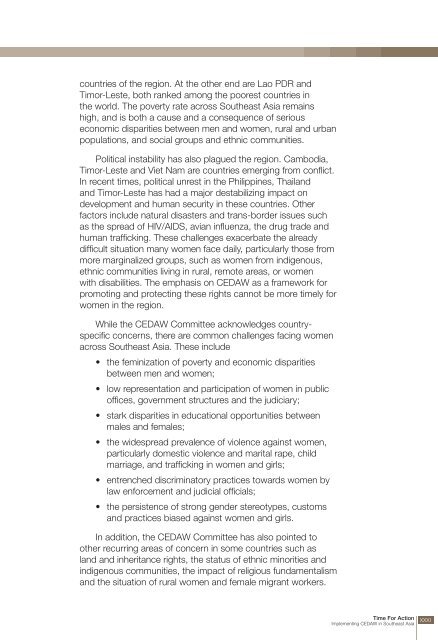Time for Action: Implementing CEDAW in Southeast Asia
Time for Action: Implementing CEDAW in Southeast Asia
Time for Action: Implementing CEDAW in Southeast Asia
You also want an ePaper? Increase the reach of your titles
YUMPU automatically turns print PDFs into web optimized ePapers that Google loves.
countries of the region. At the other end are Lao PDR and<br />
Timor-Leste, both ranked among the poorest countries <strong>in</strong><br />
the world. The poverty rate across <strong>Southeast</strong> <strong>Asia</strong> rema<strong>in</strong>s<br />
high, and is both a cause and a consequence of serious<br />
economic disparities between men and women, rural and urban<br />
populations, and social groups and ethnic communities.<br />
Political <strong>in</strong>stability has also plagued the region. Cambodia,<br />
Timor-Leste and Viet Nam are countries emerg<strong>in</strong>g from conflict.<br />
In recent times, political unrest <strong>in</strong> the Philipp<strong>in</strong>es, Thailand<br />
and Timor-Leste has had a major destabiliz<strong>in</strong>g impact on<br />
development and human security <strong>in</strong> these countries. Other<br />
factors <strong>in</strong>clude natural disasters and trans-border issues such<br />
as the spread of HIV/AIDS, avian <strong>in</strong>fluenza, the drug trade and<br />
human traffick<strong>in</strong>g. These challenges exacerbate the already<br />
difficult situation many women face daily, particularly those from<br />
more marg<strong>in</strong>alized groups, such as women from <strong>in</strong>digenous,<br />
ethnic communities liv<strong>in</strong>g <strong>in</strong> rural, remote areas, or women<br />
with disabilities. The emphasis on <strong>CEDAW</strong> as a framework <strong>for</strong><br />
promot<strong>in</strong>g and protect<strong>in</strong>g these rights cannot be more timely <strong>for</strong><br />
women <strong>in</strong> the region.<br />
While the <strong>CEDAW</strong> Committee acknowledges countryspecific<br />
concerns, there are common challenges fac<strong>in</strong>g women<br />
across <strong>Southeast</strong> <strong>Asia</strong>. These <strong>in</strong>clude<br />
• the fem<strong>in</strong>ization of poverty and economic disparities<br />
between men and women;<br />
• low representation and participation of women <strong>in</strong> public<br />
offices, government structures and the judiciary;<br />
• stark disparities <strong>in</strong> educational opportunities between<br />
males and females;<br />
• the widespread prevalence of violence aga<strong>in</strong>st women,<br />
particularly domestic violence and marital rape, child<br />
marriage, and traffick<strong>in</strong>g <strong>in</strong> women and girls;<br />
• entrenched discrim<strong>in</strong>atory practices towards women by<br />
law en<strong>for</strong>cement and judicial officials;<br />
• the persistence of strong gender stereotypes, customs<br />
and practices biased aga<strong>in</strong>st women and girls.<br />
In addition, the <strong>CEDAW</strong> Committee has also po<strong>in</strong>ted to<br />
other recurr<strong>in</strong>g areas of concern <strong>in</strong> some countries such as<br />
land and <strong>in</strong>heritance rights, the status of ethnic m<strong>in</strong>orities and<br />
<strong>in</strong>digenous communities, the impact of religious fundamentalism<br />
and the situation of rural women and female migrant workers.<br />
<strong>Time</strong> For <strong>Action</strong><br />
<strong>Implement<strong>in</strong>g</strong> <strong>CEDAW</strong> <strong>in</strong> <strong>Southeast</strong> <strong>Asia</strong><br />
XXXI

















